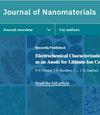Optimization on Stir Casting Process Parameters of Al7050/Nano-B4C Metal Matrix Composites
4区 材料科学
Q2 Materials Science
引用次数: 0
Abstract
Aluminum matrix composites are widely employed in aerospace, military, automobile, and transport applications. The high-strength with low-weight materials are required to fulfill the requirement of high-performance applications. The low-weight materials are reinforced with hard reinforcements to obtain high-strength-to-weight properties for using high-performance applications. The process parameters of fabrication technique define the mechanical and tribological properties. Many types of optimization tools are used for optimizing the process parameters of fabrication method. In this research, the aluminum alloy 7050 and boron carbide are selected as matrix material and reinforcement material. The fabrication of Al7050/B4C composites is produced by the stir casting method. The optimization on stir casting process parameters is done by using the Taguchi approach. The L9 orthogonal array is chosen for this investigation. The chosen input stir casting process parameters are wt% B4C, stirring time (10, 15, and 20 min), stirring speed (300, 350, and 400 rpm), and melting temperature (700, 750, and 800°C). The microhardness is selected as a valuable response parameter for optimizing the stir casting process parameters. The influencing stir casting process parameter sequence is determined by using mean table. The influencing parameters of stir casting on microhardness are stirring speed, stirring time, wt% B4C, and melting temperature. The 9 wt% of boron carbide addition increases the microhardness, and it is higher than the other wt%. The optimum combination of input process parameter combination is 9 wt% boron carbide, 750°C melting temperature, 350 rpm stirring speed, and 15 min stirring time (A3B2C2D2). The percentage of microhardness value improvement is 20.3%.Al7050/纳米b4c金属基复合材料搅拌铸造工艺参数优化
铝基复合材料广泛应用于航空航天、军事、汽车和运输等领域。为了满足高性能应用的要求,需要高强度、低重量的材料。低重量材料与硬增强增强,以获得使用高性能应用的高强度重量性能。加工工艺参数决定了材料的力学性能和摩擦学性能。许多类型的优化工具被用于优化制造方法的工艺参数。本研究选择7050铝合金和碳化硼作为基体材料和增强材料。采用搅拌铸造法制备了Al7050/B4C复合材料。采用田口法对搅拌铸造工艺参数进行了优化。本研究选用L9正交阵列。所选择的输入搅拌铸造工艺参数为wt% B4C,搅拌时间(10,15和20分钟),搅拌速度(300,350和400 rpm),熔化温度(700,750和800°C)。选择显微硬度作为优化搅拌铸造工艺参数的有价值的响应参数。采用平均表法确定了搅拌铸造工艺参数的影响顺序。搅拌铸造对显微硬度的影响参数有搅拌速度、搅拌时间、wt% B4C和熔化温度。碳化硼添加量为9 wt%时,合金的显微硬度有所提高,且高于其他wt%。输入工艺参数组合的最佳组合为碳化硼质量分数为9 wt%,熔化温度为750℃,搅拌速度为350 rpm,搅拌时间为15 min (A3B2C2D2)。显微硬度值改善率为20.3%。
本文章由计算机程序翻译,如有差异,请以英文原文为准。
求助全文
约1分钟内获得全文
求助全文
来源期刊

Journal of Nanomaterials
工程技术-材料科学:综合
CiteScore
6.10
自引率
0.00%
发文量
577
审稿时长
2.3 months
期刊介绍:
The overall aim of the Journal of Nanomaterials is to bring science and applications together on nanoscale and nanostructured materials with emphasis on synthesis, processing, characterization, and applications of materials containing true nanosize dimensions or nanostructures that enable novel/enhanced properties or functions. It is directed at both academic researchers and practicing engineers. Journal of Nanomaterials will highlight the continued growth and new challenges in nanomaterials science, engineering, and nanotechnology, both for application development and for basic research.
 求助内容:
求助内容: 应助结果提醒方式:
应助结果提醒方式:


